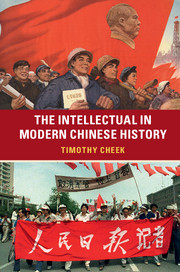Book contents
- Frontmatter
- Dedication
- Contents
- List of figures and maps
- Preface
- Acknowledgments
- List of abbreviations
- Map of China
- Introduction: for the public good
- 1 Reform: making China fit the world (1895–1915)
- 2 Revolution: awakening New China (1915–1935)
- 3 Rejuvenation: organizing China (1936–1956)
- 4 Revolutionary revival: overthrowing the lords of nation-building (1957–1976)
- 5 Reviving reform: correcting revolutionary errors (1976–1995)
- 6 Rejuvenation: securing the Chinese Dream (1996–2015)
- Conclusion: intellectuals, China, and the world
- Who's who (intellectuals featured in the main text)
- Further reading
- Bibliography
- Index
Preface
Published online by Cambridge University Press: 18 December 2015
- Frontmatter
- Dedication
- Contents
- List of figures and maps
- Preface
- Acknowledgments
- List of abbreviations
- Map of China
- Introduction: for the public good
- 1 Reform: making China fit the world (1895–1915)
- 2 Revolution: awakening New China (1915–1935)
- 3 Rejuvenation: organizing China (1936–1956)
- 4 Revolutionary revival: overthrowing the lords of nation-building (1957–1976)
- 5 Reviving reform: correcting revolutionary errors (1976–1995)
- 6 Rejuvenation: securing the Chinese Dream (1996–2015)
- Conclusion: intellectuals, China, and the world
- Who's who (intellectuals featured in the main text)
- Further reading
- Bibliography
- Index
Summary
China's intellectuals are in the news today, but what do they tell us? Xu Zhiyong, a Beijing academic and social activist, was arrested in July 2013 for his work on the Open Constitution Initiative and efforts to mobilize the New Citizens’ Movement, and sentenced to four years in prison in 2014. Ai Weiwei, China's most famous international artist today and pesky social critic, is under house arrest and unable to attend the opening of his own art shows in the West. Chen Guangcheng, a courageous local lawyer from Shandong, called “the barefoot lawyer” for his work on behalf of regular citizens, continues his asylum in the US after being hounded out of China. In December 2013 Tsultrim Gyatso, a Tibetan monk of Amchok Monastery in China's Gansu province, set himself on fire to protest the ongoing crackdown by Chinese authorities in Tibet. Liu Xiaobo, the lead author of the democratic manifesto for China, “Charter 08,” and 2010 Nobel Peace Prize-winner, is currently languishing in jail in Beijing. A similar list could have been drawn in 2010 and most probably could be in 2020. The Chinese intellectuals we hear about are dissidents. Brave, idealistic, inspiring people. Surely, we tell ourselves, a government that persecutes such fine people cannot long endure. And yet the Chinese Communist Party is with us, decades after the fall of the Berlin Wall, the demise of the Soviet Union, and the turn to “democracy” in Eastern Europe. What's the problem?
The problem is us, or rather how we look at China's intellectuals. China's intellectuals serve as a bellwether for many of us, telling us how China is doing on reform and democratization, sounding out how much China has or has not become “like us.” We use these intellectuals as a mirror for our own concerns, hopes, and fears. Yet by focusing on dissidents and religious activists, we miss most of what China's intellectuals are doing today and have done over the past century of dramatic change in Asia. How can we get past our habits and anxieties to see something more of what China's industrious, talented, and dedicated intellectuals have been doing? How do we put down our largely unconscious Chinese mirror and pick up a telescope to peep at the range of intellectual participation in public life across this huge country and tumultuous century?
- Type
- Chapter
- Information
- The Intellectual in Modern Chinese History , pp. xi - xviiPublisher: Cambridge University PressPrint publication year: 2016



